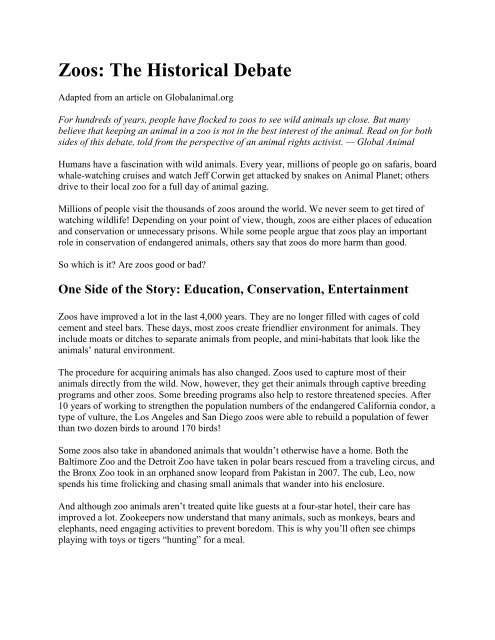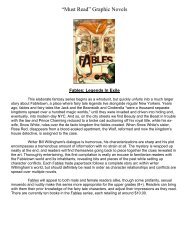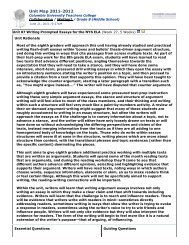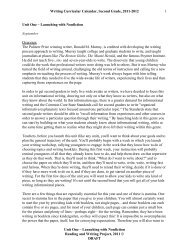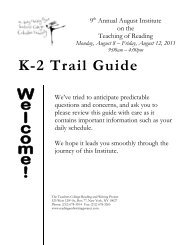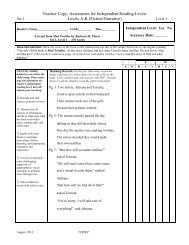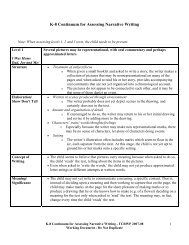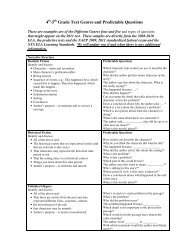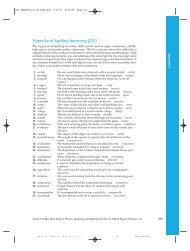Zoos: The Historical Debate - The Reading & Writing Project
Zoos: The Historical Debate - The Reading & Writing Project
Zoos: The Historical Debate - The Reading & Writing Project
You also want an ePaper? Increase the reach of your titles
YUMPU automatically turns print PDFs into web optimized ePapers that Google loves.
<strong>Zoos</strong>: <strong>The</strong> <strong>Historical</strong> <strong>Debate</strong>Adapted from an article on Globalanimal.orgFor hundreds of years, people have flocked to zoos to see wild animals up close. But manybelieve that keeping an animal in a zoo is not in the best interest of the animal. Read on for bothsides of this debate, told from the perspective of an animal rights activist. — Global AnimalHumans have a fascination with wild animals. Every year, millions of people go on safaris, boardwhale-watching cruises and watch Jeff Corwin get attacked by snakes on Animal Planet; othersdrive to their local zoo for a full day of animal gazing.Millions of people visit the thousands of zoos around the world. We never seem to get tired ofwatching wildlife! Depending on your point of view, though, zoos are either places of educationand conservation or unnecessary prisons. While some people argue that zoos play an importantrole in conservation of endangered animals, others say that zoos do more harm than good.So which is it? Are zoos good or bad?One Side of the Story: Education, Conservation, Entertainment<strong>Zoos</strong> have improved a lot in the last 4,000 years. <strong>The</strong>y are no longer filled with cages of coldcement and steel bars. <strong>The</strong>se days, most zoos create friendlier environment for animals. <strong>The</strong>yinclude moats or ditches to separate animals from people, and mini-habitats that look like theanimals’ natural environment.<strong>The</strong> procedure for acquiring animals has also changed. <strong>Zoos</strong> used to capture most of theiranimals directly from the wild. Now, however, they get their animals through captive breedingprograms and other zoos. Some breeding programs also help to restore threatened species. After10 years of working to strengthen the population numbers of the endangered California condor, atype of vulture, the Los Angeles and San Diego zoos were able to rebuild a population of fewerthan two dozen birds to around 170 birds!Some zoos also take in abandoned animals that wouldn’t otherwise have a home. Both theBaltimore Zoo and the Detroit Zoo have taken in polar bears rescued from a traveling circus, andthe Bronx Zoo took in an orphaned snow leopard from Pakistan in 2007. <strong>The</strong> cub, Leo, nowspends his time frolicking and chasing small animals that wander into his enclosure.And although zoo animals aren’t treated quite like guests at a four-star hotel, their care hasimproved a lot. Zookeepers now understand that many animals, such as monkeys, bears andelephants, need engaging activities to prevent boredom. This is why you’ll often see chimpsplaying with toys or tigers “hunting” for a meal.
<strong>Zoos</strong> also give scientists a chance to conduct research. In 2002, zoos participated in 2,230research and conservation projects in more than 80 countries. <strong>The</strong> information they gather helpsthem to develop new medicines and techniques to improve animal health.Beyond the positive impact zoos try to have on animals, they often affect the people visiting aswell. <strong>Zoos</strong> don’t just entertain, they also try to educate. With a variety of programs gearedtoward children and adults, zoos teach people about the needs of animals and the importance ofconservation.<strong>The</strong> fact that zoos impact people in a positive way is nice, but it’s not the people critics worryabout — it’s the animals.Another Perspective: Wild Animals Are Meant to Be WildMaggie the elephant is a perfect example of why zoos are not good. For years, Maggie wasforced to spend her days in a small indoor enclosure because it was too cold for her to go outside.<strong>The</strong> zoo put an elephant-sized treadmill in her cage so that she could exercise, but she refused touse it.It can be incredibly difficult to provide for the needs of animals like elephants. If Maggie andother zoo elephants lived in the wild, they would wander as much as 30 miles a day in largegroups, grazing on leaves and stopping to splash in watering holes. In a zoo, they’re lucky to geta few acres and a roommate or two.Maggie’s story is just one of many. Zebras at the National Zoo in Washington D.C. starved todeath because of insufficient or incorrect food, and the same zoo’s red pandas died after eatingrat poison.<strong>The</strong> Animal Welfare Act in the United States sets standards for zoos here, and some conditionshave improved—but some say it is still not good enough. Although natural-looking habitats aremore attractive, people like David Hancocks, a zoo consultant and former zoo director, describethem as mere illusions. <strong>The</strong> animals’ homes look prettier, but they really aren’t any better thanthey were before. Indeed, many captive animals exhibit signs of severe distress: People havewitnessed elephants bobbing their heads, bears pacing back and forth and wild cats obsessivelygrooming themselves.<strong>Zoos</strong> may not even benefit people as much as we once thought. According to one study, manyvisitors don’t pay much attention to the animals — they’re actually talking to each other aboutunrelated things and spending only a few minutes at each display.It is unclear whether zoos are good or bad for animals. As you’ve seen, it depends a lot on whatzoo you’re talking about, and what the animals are experiencing. If you could talk to animals,Leo the snow leopard would probably tell you that zoos are great; however Maggie the elephantmight respond by slapping you with her trunk.
Response to: “<strong>Zoos</strong>: <strong>The</strong> <strong>Historical</strong> <strong>Debate</strong>”This article presents some pros (positive sides) and cons (negative sides) of zoos. Use the chartbelow to sort the reasons and evidence that the author gives us into these categories. Be sure tofind more than one text detail for each category. <strong>The</strong>n think about whether there is strongerevidence for or against zoos, and write to explain your thinking.Pros: Why <strong>Zoos</strong> Are GoodCons: Why <strong>Zoos</strong> Are BadText Details:Text Details:Which side has the strongest evidence? Choose one piece of evidence and explain why it is astrong piece of evidence in this debate.__________________________________________________________________________________________________________________________________________________________________________________________________________________________________________________________________________________________________________________________________________________________________________________________________________________________________________________________________________________________________________________________________________________________________


